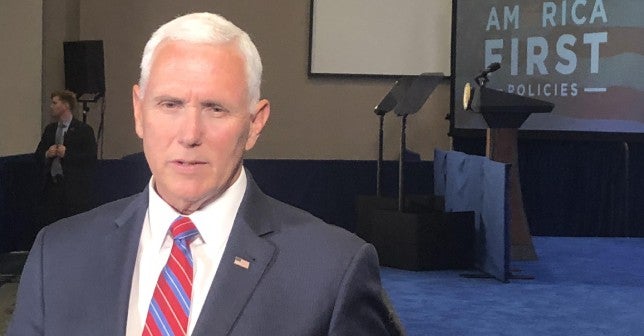“It’s time for the Congress to do their job,” the vice president said during a speech in Florida on Monday.
With U.S. tariffs on steel and aluminum and retaliatory tariffs from Canada and Mexico on goods including American pork, cheese and orange juice lifted, Vice President Mike Pence said Monday it is time to focus on ratifying the United States-Mexico-Canada Agreement (USMCA).
“I came here to Florida today to tell you for all we’ve done so far, for all we’ve done to keep this economy moving, the time has come for the Congress of the United States to pass the largest trade deal in American history. The time has come for Congress to pass the USMCA,” he said during a speech in Jacksonville, Fla., at an event organized by America First Policies. “The USMCA is a win for Florida and a win for America. The president has done his job. It’s time for the Congress to do their job and pass the USMCA this summer.”
House Democrats, however, are seeking increased labor, environment, enforcement and pharmaceutical provisions in the USMCA, which has stronger provisions in these areas than NAFTA. The House Ways and Means Committee is scheduled to hold a hearing at 10 a.m. Wednesday about the enforcement of the new trade agreement.
House Speaker Nancy Pelosi, D-Calif., recently said, “We’re as far away as getting an enforcement agreement,” when asked about how far away a USMCA approval vote is, CNBC reported.
Pence told reporters after the event that negotiations of the trade deal are finished, but it is possible through enabling legislation to “adopt certain provisions that will guide the implementation of the USMCA. We’re very open to that.”
During a roundtable discussion of USMCA and American trade relations that preceded the vice president’s remarks, Rep. Michael Waltz, R-Fla., said, “I think any Democrat who’s saying they oppose this is due to pure politics.
“At the end of the day Nancy Pelosi has to bring this to the floor, has to get it to vote. I think she’s scared to get it to vote because it will give the president a win this administration it absolutely deserves,” Waltz said.
Florida Commissioner of Agriculture and Consumer Services Nikki Fried criticized the USMCA on Twitter Monday. She tweeted the state’s farmers will be hurt “by continued unfair trade & Mexican dumping of seasonal crops.”
“Smoke and mirrors from the White House won’t help our proud but struggling farmers,” she tweeted. “In a state that depends on agriculture, we can’t afford a trade agreement that allows Mexico to continue dumping artificially low-priced seasonal crops into our country.”
Seasonal produce, which is harvested and sold within eight weeks, is not addressed within USMCA, Rep. John Rutherford, R-Fla., said during the roundtable discussion.
“The problem is when you have dumping tomatoes and cucumbers and others from Mexico, which is huge, we have no ability to counter that dumping because right now the rules under NAFTA is what transpires over a year,” he explained. “It’s the way you measure something. Dumping is measured over a year. Well, it’s all taking place over eight weeks, but if you string it out over the course of a year it doesn’t look as bad. But no, it’s devastating for our seasonal markets.”
Sen. Marco Rubio, R-Fla., and Congressmen Vern Buchanan, R-Fla., and Al Lawson, D-Fla., introduced a bill in January that would ease certain thresholds to allow Florida farmers to petition to the Commerce Department and the U.S. International Trade Commission “to investigate illegal subsidies and dumping of Mexican fruits and vegetables into the U.S. market,” acknowledging the “unique circumstances of seasonal fruit and vegetable producers,” according to a press release announcing the legislation.
They, along with more than 30 other lawmakers, signed a letter sent to U.S. Trade Ambassador Robert Lighthizer in April for improved mechanisms to “initiate and sustain legitimate antidumping and countervailing duties proceedings for trade in seasonal and perishable produce.”
USMCA does have provisions that could help other areas of agriculture. If ratified, it would create additional access for U.S. dairy products and eliminate certain Canadian dairy pricing strategies. Republican leaders of the House Agriculture Committee urged Congress to pass the trade agreement after hearing testimony from U.S. dairy representatives in late April.
The updated trade agreement also would impact the automotive industry. USMCA would require the regional content value of automotive content increase to 75%, which is up from 60% under NAFTA.
“The problem was the other 40% could come from anywhere, and where do you think they were coming from? China,” Rutherford said. “China was shipping all of these auto parts that were being manufactured in China to Mexico and then they were imported into America tax free. USMCA is going to do away with all of that.”
USMCA also would require that 40% to 45% of automobile content be produced by workers earning at least $16 an hour by 2023.
The U.S. International Trade Commission — a bipartisan, fact-finding commission — reported in its analysis forecasts USMCA would result in $34 billion in new automotive manufacturing investments in the U.S., $23 billion in new annual U.S.-made auto parts purchases and 76,000 new U.S. automotive sector jobs over the first five years of implementation.
The commission estimated the trade agreement would raise U.S. real GDP by 0.35% ($68.2 billion) and U.S. employment 0.12% (176,000 jobs) if fully implemented and employed. Exports to Canada and Mexico would increase 5.9% ($19.1 billion) and 6.7% ($14.2 billion), respectively, and imports from Canada and Mexico would rise by 4.8% ($19.1 billion) and 3.8% ($12.4 billion).
“There’s an old saying that Congress does two things well: nothing and overreact,” Pence said in his speech. “The truth of the matter is we can’t afford Congress to do nothing. We need Congress to approve the USMCA this summer to keep America growing.”










